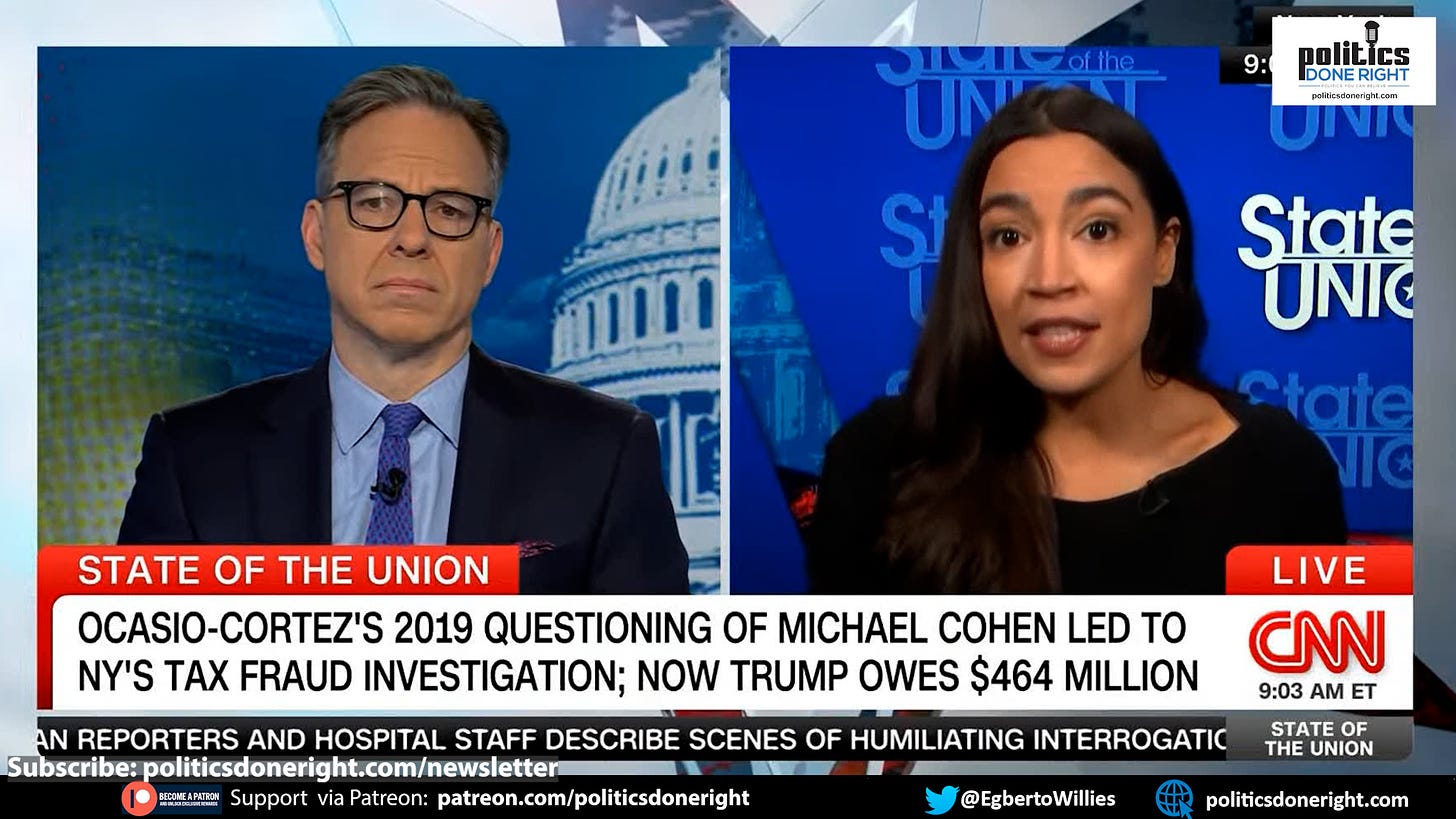AOC shuts down Tapper about Trump’s unequal treatment: He’s ‘unethical’ & ‘prone to criminality.
Alexandria Ocasio-Cortez (AOC) did not mince her words when answering two leading questions about Donald Trump’s legal treatment. He’s ‘unethical’ & ‘prone to criminality.
In a recent dialogue on “State of the Union,” Representative Alexandria Ocasio-Cortez (AOC) engaged with host Jake Tapper in a conversation that illuminated the prevailing narratives surrounding Donald Trump’s legal entanglements and their political ramifications. Tapper, a journalist who generally resists the mainstream media’s inclination to echo right-wing narratives, posed questions to Ocasio-Cortez that seemed to stray from this commendable stance. He inquired whether the potential seizure of Trump’s assets could inadvertently bolster his political support by feeding into the narrative of persecution by the “Deep State” and Democrats. Furthermore, Tapper questioned whether the multitude of charges against Trump might appear as overkill to independent voters, suggesting a bias in the legal scrutiny directed at him.
Ocasio-Cortez’s responses underscored a principled stand on equality before the law and the ethical and legal considerations in Trump’s case. She highlighted the meticulous approach of New York Attorney General Letitia James in handling the fraud investigation that led to a significant penalty against Trump, emphasizing the importance of applying legal standards uniformly, regardless of the individual’s political stature or influence. The congresswoman articulated the broader implications of failing to address the alleged financial improprieties and potential political corruption associated with Trump, pointing out the risks of inaction.
This conversation goes beyond the specifics of legal strategy or political calculus, touching on fundamental questions about the rule of law, accountability, and the role of media in shaping public perception. The narrative that attacking Trump for his legal troubles could somehow benefit him politically — a notion that has been circulated within both mainstream and right-wing media — reflects a troubling normalization of criminal behavior in political figures. It suggests that loyalty to a political figure could outweigh ethical considerations or the law itself, a stance that undermines the principles of justice and democracy.
The questions raised by Tapper, whether intentionally or not, mirror a broader issue within media discourse: the perpetuation of narratives that frame legal accountability as political persecution, especially when directed at figures like Trump. This framing distorts the public’s understanding of the legal processes and risks entrenching the idea that political affiliation should shield individuals from legal scrutiny. Such narratives contribute to a polarized environment where partisan interpretations overshadow factual bases for legal actions.
Ocasio-Cortez’s firm rebuttal to these narratives — emphasizing the non-partisan nature of legal accountability and the gravity of the allegations against Trump, including his role in inciting the Capitol riot — serves as a corrective to the distorted narratives that have taken root in public discourse. Her insistence on treating Trump like any other citizen subject to the law reinforces the principle that no individual is above the law, a cornerstone of democratic governance.
This episode underscores the critical role of media in framing political and legal discussions. When media figures echo narratives undermining legal accountability for political reasons, they create a climate of cynicism and distrust in legal institutions. Conversely, when they challenge these narratives and highlight the importance of the rule of law, they reinforce the foundations of democratic governance. The exchange between Tapper and Ocasio-Cortez thus reflects broader debates about the intersection of politics, law, and media and the responsibilities of each in upholding the principles of justice and democracy.
AOC shuts down Tapper about Trump’s unequal treatment.
In the face of narratives that seek to muddy the waters of legal accountability for political gain, it is essential to maintain a clear-eyed view of the principles at stake. Like any other individual, legal scrutiny of Trump’s actions is not a matter of political overreach but a necessary process to uphold the law. The insistence on treating Trump’s legal challenges as mere political fodder not only misrepresents the nature of these proceedings but also undermines the integrity of the legal system itself. As the conversation between Tapper and Ocasio-Cortez illustrates, confronting these narratives is crucial in preserving the rule of law and the democratic values it serves.
Please support our values via Independent Media.
The other side has big donors and everyday citizens who invest heavily in platforms that lie and misinform. All we have is you. So, please invest in our media outlet by clicking the subscribe button below to become a paid subscriber. You won’t miss that coffee, but it will make a difference in our politics as we spread the truth about our policies and progressive politics. All paid subscribers get to read my five books on this platform and all subsequent books I write. They will also be privy to subsequent incentives.







